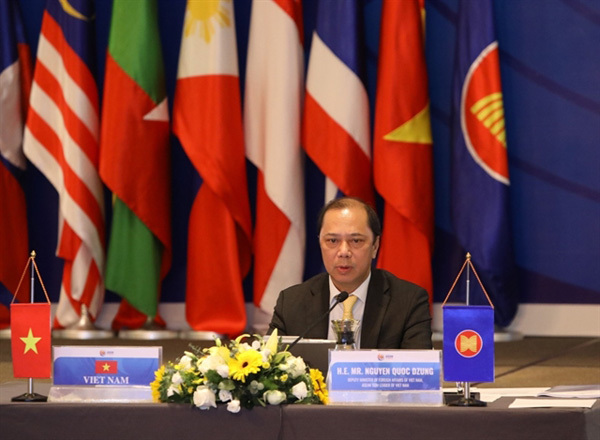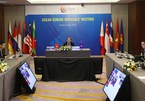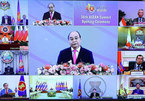on the important benefits that Vietnam has enjoyed from the ASEAN Community and how it intends to contribute to the association.
 |
| Vietnamese Deputy Minister of Foreign Affairs Nguyen Quoc Dung. — VNA/VNS Photo |
Vietnam’s joining of the Association of the Southeast Asian Nations (ASEAN) is the right, astute decision by the Party and the State, marking a significant milestone in our international integration. What are your reflections on the past 25 years we’ve been in ASEAN?
The past 25 years have seen major changes and transformation in both Vietnam and ASEAN.
At its inception, the bloc was created out of confrontations and distrust in the region, but now ASEAN has become an organisation linking a successful, dynamic region with economic potentials ranking fifth in the world that is attracting attention and cooperation from the international community.
Vietnam in this period has also transitioned from an oudated, centralised economy into a country with medium income level, and an open market economy that is integrating deeply into regional and global structures.
From its very first tentative steps, Vietnam has become an active, proactive, and responsible member of ASEAN, which works with other member countries to address emerging challenges and contribute to the settlement of strategic issues related to peace, development, and prosperity of the bloc; which in turn, elevate the profile of ASEAN as well as Vietnam in the region and in the world.
Over the past 25 years, what do you consider the important benefits that Vietnam has gained from participating in ASEAN?
Becoming a member of ASEAN has brought about great benefits to Vietnam in various fields, which can be grouped into three main points:
First of all, the ASEAN membership facilitates Vietnam’s fast and sustainable growth: ASEAN avails us of a peaceful and stable environment for our country’s development; ASEAN helps Vietnam expand partnerships with more countries and territories in the world, especially major and important partners; and ASEAN helps us broaden our market, attract more resources from outside for our development; and enables our deeper integration to the region and the world.
Secondly, ASEAN membership has given us support in enhancing our capacity: In attempting to be more in line with ASEAN and the world’s steps, Vietnam has carried out reforms and bettered our institutions towards regional and international standards. Vietnam has also boosted the capacity and skills of its bureaucrats and officials in all sectors and agencies, especially in terms of multilateral foreign affairs.
Thirdly, becoming an ASEAN member has certainly raised the position and role that Vietnam plays on the world stage, while helping the country become more confident to join more international playgrounds.
Vietnam has become an active member of not only ASEAN but also the international community. From mere participation, Vietnam has gotten to a point where it is firm and confident enough to engage in international integration, making practical contributions to global affairs.
In the last 25 years, what notable contributions has Vietnam made to the mutual efforts in building the ASEAN Community?
Vietnam has made significant contributions to the building of the ASEAN Community.
Firstly, as a middle-level country in the region with population and area ranking third and fourth in Southeast Asia, Vietnam’s participation in ASEAN has helped this organisation grow in strength, scope and structure, enabling ASEAN to become a strong organisation, putting an end to distrust, divisions and hostile confrontations and opening up a new period of development, peace, and cooperation.
Secondly, Vietnam has actively participated in and contributed to the forging of ASEAN's development directions and major policies, including the ASEAN Charter, ASEAN Community Vision 2025 and related master plans, including the Master Plan on ASEAN Connectivity (MPAC) and the Initiative for ASEAN Integration Initiative (IAI), among others.
Thirdly, Vietnam has made positive and responsible contributions to the implementation of ASEAN common decisions. We have fully and extensively participated and implemented cooperative activities across political-security, socio-cultural and economy fields; as well as presiding over relevant events as per member’s duties.
Vietnam is one of the countries with high rates of implementation of ASEAN's economic integration programmes and measures.
Overcoming the initial unfamiliarity, in just three years after joining ASEAN in 1995, Vietnam successfully organised the 6th ASEAN Summit in Hanoi in December 1998, after that, we have successfully carried out the role of ASEAN Chair in 2010, building an important premise for the current ASEAN Chairmanship this year.
In addition, we have also contributed to the formation, consolidation and advancement of institutions established and led by ASEAN. Among the most notable contributions are the decision to expand the East Asia Summit (EAS) to admit the US and Russia, the first holding of the ASEAN Defence Ministers Meeting Plus (ADMM+), and successful campaigning to become ASEAN representative to attend the G20 Summit held in South Korea and Canada.
What do you consider the important factors in the development and success of ASEAN?
ASEAN is a diverse community in terms of ethnic groups, cultures, levels of development, political institutions, but ASEAN is still considered a successful regional organisation.
First of all, ASEAN's success can be attributed to the “ASEAN Way,” which embraces consensus and non-interference in each other's internal affairs, and maintaining mutual respect for each other; taking firm, appropriate steps and ensuring equality of interests and responsibilities of member countries, ensuring that all members feel included and comfortable in the decision-making process where no voice is left out.
The second factor that makes for a successful ASEAN is its geostrategic and geo-economic factors. Located in an important geostrategic position, being right in the centre of a large area connecting the Indian and Pacific oceans, ASEAN has always been an important position in international relations and closely linked to the benefits of great powers in the world. With its 650-million-strong population, the ASEAN region is a highly potential market with a dynamic economy and a global economic bright spot. By 2050, ASEAN is expected to become the fourth largest economy in the world.
The third factor is ASEAN's aspirations and endeavours to build a neutral and peaceful region where countries with different political systems, development level, cultures and religions can still cooperate, ensuring security, stability and maintaining economic growth.
Another fundamental factor in the successes of ASEAN is that it managed to create mechanisms and playgrounds in the region that attract the attention and active participation of countries, especially major powers, contributing to the construction and shaping of regional structures.
An increasing number of external partners are looking forward to establishing partnerships with ASEAN and joining the Treaty of Amity and Cooperation in Southeast Asia (TAC).
Could you tell us about the development orientation of ASEAN until 2025 and the following years, and what role will Vietnam play in this process?
After five decades, ASEAN has made its mark as a successful regional organisation.
Against the backdrops of fast-changing and unpredictable developments in the region and the world, ASEAN must succeed in building a cohesive, self-resilient and strong community.
To this end, the grouping needs to enhance intra-bloc connections through mutual interests, improving and consolidating existing cooperation foundations and institutional frameworks.
How can ASEAN engender a conducive environment for countries to grow even better, get even closer, or better adapt to changes – especially ones brought forth by the strategic competition between major powers in the world, and the Fourth Industrial Revolution?
This is precisely what Vietnam wants to convey in its theme and priorities – Cohesive and Responsive – for its chairmanship year 2020.
Also equally important is that ASEAN needs to reinforce and promote its central role in the region. A united and unanimous ASEAN is a decisive factor that will help the association maintain its key role in the region and a balanced, mutually beneficial relationship with its partners.
The development orientation for ASEAN in the near future is very much aligned with Vietnam’s policies. ASEAN has always been one of the top priorities in Vietnam’s foreign policy.
Enjoying the benefits that the ASEAN Community brings, Vietnam will continue to proactively propose initiatives and orientations to contribute to efforts in building the Community.
A strong and self-resilient ASEAN Community will provide a firm backing for Vietnam to weather and overcome increasingly difficult waves of challenges in the future. VNS

Building ASEAN Community remains top priority: Senior ASEAN officials
Successfully building the ASEAN Community continues to be a top priority of the bloc despite the difficulties and challenges posed by the ongoing COVID-19 pandemic,

From member to chair: 25 years of Vietnam in ASEAN
Vietnam became the seventh member of the Association of Southeast Asian Association of Nations (ASEAN) on July 28, 1995, marking a milestone in the country’s integration into regional affairs as well as in regional co-operation.
 Deputy Minister of Foreign Affairs Nguyen Quoc Dung, Chair of Vietnam’s ASEAN Senior Officials’ Meeting (SOM), granted an interview to the media for the country’s 25th anniversary of ASEAN membership
Deputy Minister of Foreign Affairs Nguyen Quoc Dung, Chair of Vietnam’s ASEAN Senior Officials’ Meeting (SOM), granted an interview to the media for the country’s 25th anniversary of ASEAN membership